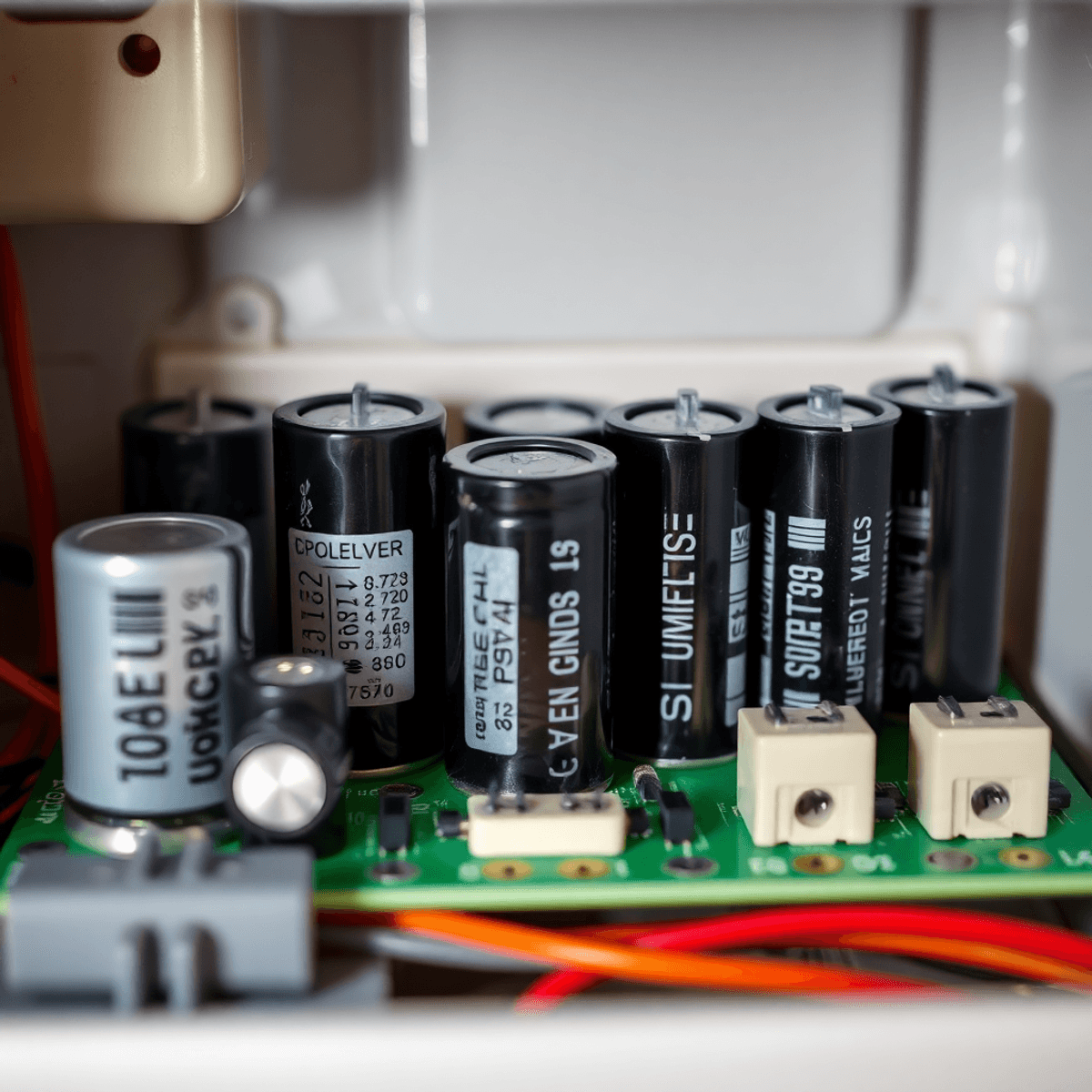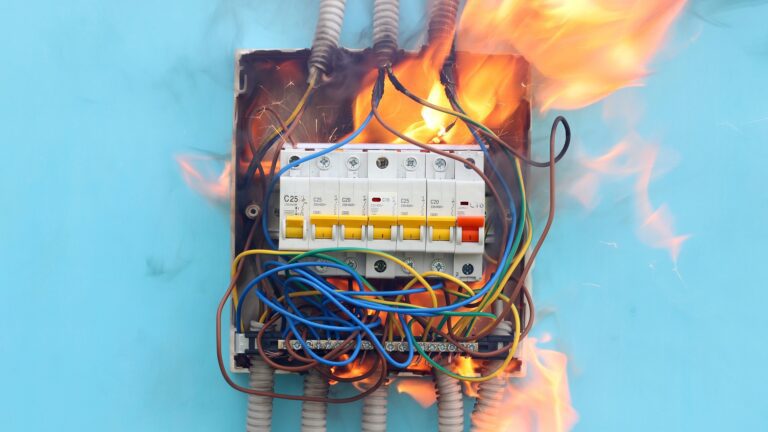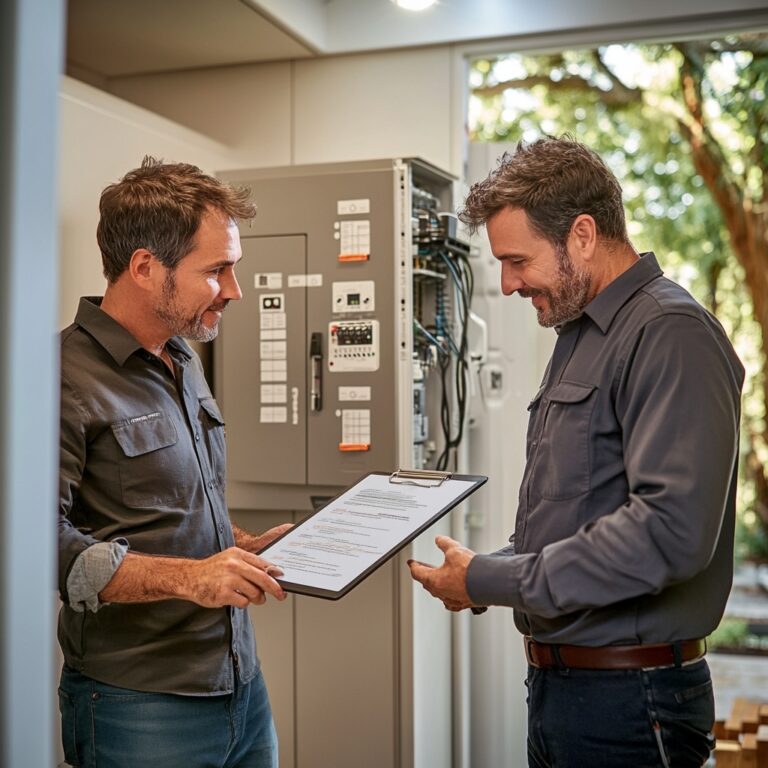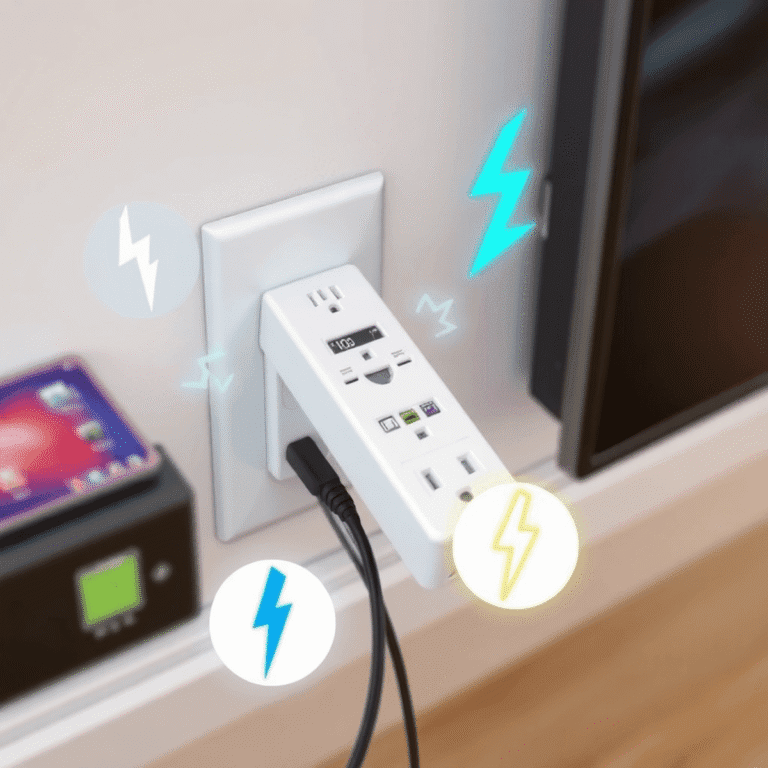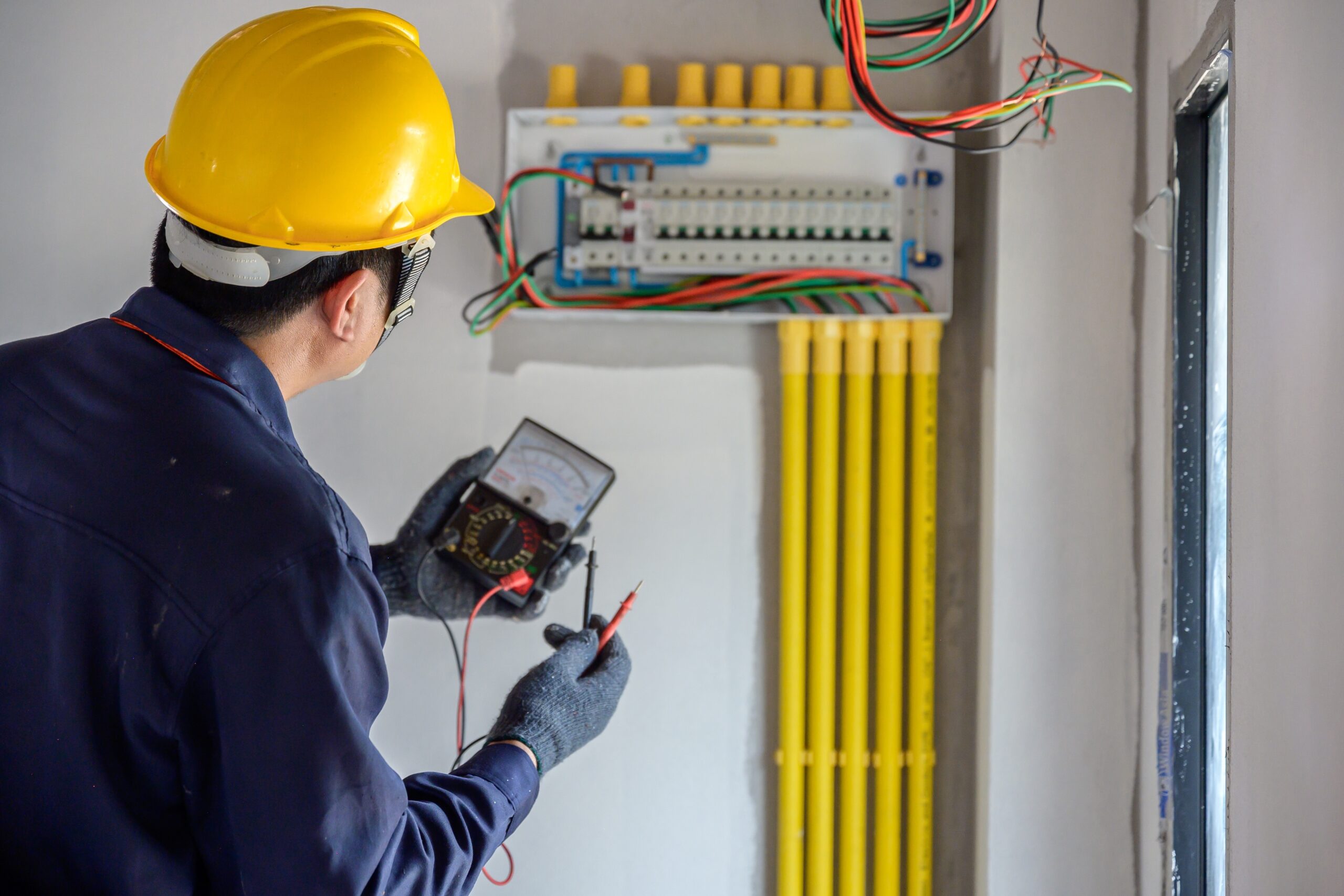The Hidden Role of Capacitors in Your Appliances
Capacitors are small but important electrical parts that are often overlooked in household appliances. They store and release energy, making them essential for the smooth functioning of everyday devices. To ensure these appliances work efficiently and last longer, it’s crucial to understand how capacitors function in appliances.
This article explores the significance of capacitors in various household items. We’ll discuss how they contribute to starting motors, maintaining steady operation, optimizing energy usage, and reducing electromagnetic interference. By recognizing the role of capacitors, you can improve your appliance maintenance practices and potentially save money in the long run.
In this article, you will learn:
- What capacitors are and the types commonly used in appliances
- How capacitors function inside household appliances
- Key roles capacitors play beyond motor support
- Signs indicating a failing capacitor
- Benefits of high-quality capacitors and the importance of certified electricians for maintenance
Understanding the hidden role of capacitors will empower you to take better care of your appliances. However, it’s important to remember that when it comes to maintaining or replacing these components, professional assistance is crucial. Certified electricians can provide expert help with tasks like capacitor replacement or repair. You can find qualified electricians through platforms such as Protek Eds.
What Are Capacitors? A Simple Explanation
A capacitor is an electrical component designed to store and release energy rapidly. Unlike batteries, which provide a steady flow of power, capacitors deliver quick bursts of energy and then recharge almost instantly. This ability makes them essential for stabilizing voltage and providing the extra kick needed to start electric motors in household appliances.
Two Common Types of Capacitors in Appliances
Two common types of capacitors found in appliances include:
1. Electrolytic Capacitor
- Large capacitance values allow these components to store more energy.
- Polarized design means they must be installed in a specific direction within a circuit.
- Frequently used in devices that require significant energy boosts, such as refrigerators or air conditioners.
2. Ceramic Capacitor
- Small capacitance values make these suitable for fine-tuning circuits and filtering out electrical noise.
- Non-polarized, so installation direction does not matter.
- Common in smaller electronics and circuit boards inside appliances.
Understanding these basic types helps clarify why capacitors are so crucial for reliable appliance operation and how their characteristics match different functional demands.
How Capacitors Work Inside Household Appliances
Capacitors in household appliances play a crucial role in ensuring smooth operation and energy efficiency. Specifically, they are vital in motor-driven devices like refrigerators, washing machines, and air conditioners.
Motor Starting Capacitor
A motor starting capacitor provides an initial energy boost to start the motor. Without this energy surge, motors might struggle to start, especially when under load. This initial boost is critical in appliances such as:
- Refrigerators: Helps the compressor motor start quickly and efficiently.
- Air Conditioners: Assists in starting the blower motor to circulate air.
- Washing Machines: Enables the drum motor to begin its spin cycle effectively.
Motor Running Capacitor
A motor running capacitor supports the steady operation of the motor once it has started. This component ensures that the motor runs smoothly throughout its cycle, maintaining consistent performance. It is particularly important for:
- Refrigerators: Ensures continuous operation of the compressor for effective cooling.
- Washing Machines: Maintains a stable rotation speed for efficient washing and spinning.
By providing both starting and running support, capacitors help maintain the efficiency and longevity of your household appliances, ultimately saving you from frequent repairs or replacements.
Key Functions of Capacitors Beyond Motor Support
Capacitors play critical roles beyond just supporting motor operations in household appliances. They contribute significantly to power factor correction, optimizing energy usage and reducing electricity costs. By adjusting the phase difference between voltage and current, capacitors help maintain a high power factor. This reduces the reactive power drawn from the grid, ensuring that your appliances operate more efficiently and lowering your electricity bills.
Noise Reduction
Noise reduction capacitors are essential for filtering out electromagnetic interference (EMI). This type of interference can disrupt the electronic circuitry within appliances, causing them to malfunction or degrade over time. By smoothing out these electrical noises, capacitors protect sensitive components and ensure stable operation.
Voltage Regulation
Voltage regulation capacitors also stabilize voltage levels within appliances. They absorb voltage spikes and surges, preventing potential damage to the appliance’s internal electronics. This not only extends the lifespan of your devices but also ensures consistent performance.
Understanding these hidden roles highlights how capacitors significantly contribute to the efficiency and longevity of your household appliances.
Signs Your Appliance Capacitor Might Be Failing
Identifying a faulty capacitor early can prevent extensive damage and costly repairs. Here are several common symptoms indicating a failing or faulty capacitor:
- Difficulty Starting Motors: If your appliance struggles to start or requires multiple attempts, it might be due to a failing capacitor.
- Intermittent Operation: Appliances may start but then stop abruptly, indicating inconsistent energy supply from the capacitor.
- Humming Noise Appliance: A humming or buzzing sound during the startup phase can signal capacitor issues.
- Clicking Sounds: Clicking noises when turning on an appliance often point to a failing capacitor struggling to provide the necessary power boost.
Recognizing these signs allows you to address potential issues promptly and maintain optimal appliance performance.
Why Replacing Faulty Capacitors Is Cost-Effective Maintenance
Replacing a faulty capacitor can restore proper functioning to your appliances without the need for an entire unit replacement. This is particularly advantageous because:
- Capacitor replacement benefits: A new capacitor can resolve issues such as difficulty starting motors or intermittent operation, ensuring the appliance runs smoothly again.
- Appliance repair cost-saving: The cost of replacing a capacitor is significantly lower than purchasing a new appliance or undertaking major repairs. For instance, replacing a capacitor in a refrigerator might cost around $50 to $150, whereas buying a new refrigerator could easily exceed $500.
By focusing on capacitor maintenance, you can extend the lifespan of your household appliances, maintain energy efficiency, and avoid the higher costs associated with full replacements or extensive repairs.
Benefits of High-Quality Capacitors in Appliances
High-quality capacitors play a crucial role in appliance performance. Investing in superior components delivers long-term reliability and supports the core theme of The Hidden Role of Capacitors in Your Appliances.
Enhanced Durability and Reliability
- Appliances equipped with high-quality capacitors experience fewer breakdowns.
- Superior materials and construction resist heat, voltage spikes, and aging.
- Consistent performance reduces the risk of unexpected failures, protecting sensitive circuits in devices such as refrigerators, air conditioners, or washing machines.
Energy Efficiency Advantages
- High-quality capacitors help maintain a stable power factor, directly influencing energy efficiency in appliances.
- Efficient energy storage and delivery reduce wasted electricity and lower operating costs.
- Improved power management protects motors from strain, leading to quieter operation and extended lifespan. This is particularly true for appliances that utilize a run capacitor, which plays a significant role in energy efficiency.
Choosing high-quality capacitors advantages both performance and savings, making them essential in energy efficiency appliances. These benefits highlight why not all capacitors are created equal—premium options pay off through lower utility bills and greater peace of mind.
The Role of Certified Electricians in Capacitor Maintenance and Replacement
Certified electricians play a critical role when it comes to safe and effective capacitor installation or replacement inside household appliances. Capacitors operate under high voltage, and incorrect handling can lead to serious injury or damage to the appliance. Engaging certified electricians in Melbourne ensures that all work complies with strict safety codes and manufacturer specifications, protecting your home and family.
Why rely on professionals for capacitor repair?
- Proper diagnosis of capacitor health, avoiding unnecessary replacements
- Expert handling of hazardous components, preventing electrical hazards
- Guarantee of workmanship, backed by insurance and compliance with Australian standards
Trusted providers such as Protek Electrical and Data deliver a comprehensive suite of professional capacitor repair and replacement services across Melbourne’s western suburbs. Their offerings go beyond basic repairs:
- Installation of high-quality capacitors for residential or commercial appliances
- Preventative maintenance checks to identify potential issues early
- Transparent, upfront pricing so you know exactly what to expect
- Technicians undergo rigorous training in both safety protocols and customer service
Choosing an experienced service provider means you benefit from more than technical expertise—Protek’s commitment extends to reliability, neatness on site, and respectful communication throughout the process. This dedication reduces appliance downtime while ensuring lasting repairs that stand up to daily use.
Professional intervention keeps your appliances running efficiently while upholding stringent safety standards—an essential foundation for any well-maintained modern home.
Conclusion
- Regularly check your appliances for signs of capacitor problems—such as hard starts, odd noises, or inconsistent operation.
- Prompt action and support from a certified electrician make a difference in both safety and cost savings.
- The Hidden Role of Capacitors in Your Appliances is more than an engineering detail; it’s key to avoiding expensive breakdowns and unnecessary replacements.
- Understanding the importance of appliance maintenance with capacitors helps extend the life of your household devices and keeps energy bills in check.
Hidden role of capacitors summary: Paying attention to this small yet vital component can protect your investments and ensure peace of mind at home.
FAQs (Frequently Asked Questions)
What are capacitors and why are they important in household appliances?
Capacitors are electrical components that store and release energy. They play a crucial role in household appliances by helping motors start smoothly, supporting steady operation, optimizing energy usage through power factor correction, reducing electrical noise, and regulating voltage. Understanding capacitors is essential for enhancing appliance efficiency and longevity.
What types of capacitors are commonly used in household appliances?
The most common types of capacitors found in household appliances are electrolytic capacitors and ceramic capacitors. Electrolytic capacitors have large capacitance and are polarized, making them suitable for motor starting applications. Ceramic capacitors have smaller capacitance, are non-polarized, and are often used for noise reduction and voltage regulation.
How do capacitors help motors in appliances like refrigerators and washing machines?
Capacitors assist motors by providing an initial energy boost to start them smoothly (motor starting capacitor) and by supporting steady motor operation during appliance cycles (motor running capacitor). This ensures efficient performance and reduces strain on the motor components.
What are the signs that an appliance’s capacitor might be failing?
Common symptoms of a failing capacitor include difficulty starting the appliance’s motor, intermittent operation, and unusual audible signs such as humming or clicking noises during startup phases. Recognizing these signs early can prevent further appliance damage.
Why is replacing a faulty capacitor considered cost-effective maintenance?
Replacing a faulty capacitor restores proper appliance function without the need to replace the entire unit or perform major repairs. This approach saves money by extending the life of the appliance and avoiding costly replacements.
Why should I hire certified electricians for capacitor maintenance or replacement?
Certified electricians ensure safe and effective installation or replacement of capacitors. Professionals like those at Protek Electrical and Data in Melbourne’s western suburbs offer trusted services that comply with safety standards, providing peace of mind and reliable appliance performance.

